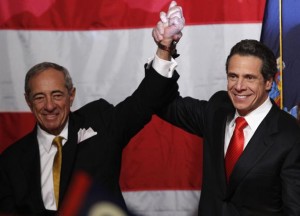Who in the World is Kathy Hochul?
Friday, August 27th, 2021By Bob Gaydos
Move over FDR and Teddy R. Step aside, Mr. Harriman, Mr. Rockefeller. Make way for history, John Jay, Martin Van Buren and Grover Cleveland. In fact, Al Smith, Ham Fish, George Pataki et al, how about a round of applause? This week, August 24 to be precise, New York State got its first woman governor.
It only took 231 years. Thirty states managed to accomplish this feat before New York. The new governor of New York is Kathy Hochul. Until recently, most New Yorkers had never heard of her. That’s true of most lieutenant governors, but most lieutenant governors don’t get to become governor when the actual governor resigns. That’s how Hochul got the job. No matter. Her moment in history deserves more recognition than it has received.
Let’s start with the irony of the situation. Andrew Cuomo, whom Hochul replaced as governor, chose her as his running mate in 2014 because she was from upstate and because he thought a woman on the ticket would bring him more votes. He used her for political reasons. Cuomo was forced to resign, of course, because nearly a dozen women accused him of using them to address his sexual needs. He denied the charges, but bowed to overwhelming pressure from fellow Democrats to resign.
Perhaps the most damaging response to the allegations came from the state attorney general, Letitia James, whose investigation produced a report that described a “hostile work environment” created by Cuomo’s actions. James, also a Democrat, through her involvement in investigating Donald Trump’s taxes, has become one of the best-known, politically influential women in a state that for a long time did not encourage such ambition.
In fact, the state did not have a female senator until 2002, when Hillary Clinton, a transplant from Washington, D.C,, won election. She was succeeded by Kirsten Gillebrand when Barack Obama tapped Clinton to be his Secretary of State. Gillebrand is still in the Senate, but is not necessarily influential in New York politics. Nor has any of the several congresswomen elected over the years from the New York metropolitan area been especially influential in state politics.
State government has been a boys club for a long time in New York. Hochul says she’s ready to integrate that club by running for election, and winning, on her own next year. She will undoubtedly face a tough primary challenge, but first she has the challenge of the ongoing Covid pandemic to deal with as well as that lingering hostile environment around the governor’s office. Can she do it? She said she intends to do both in her swearing-in remarks.
How well she handles those challenges may hold the answer to another question: Can a one-term congresswoman and former county clerk, who spent most of her time in Albany as a goodwill ambassador to the state’s 62 counties, convince New Yorkers that she can run their government?
By the way, Hochul is not the only New York lieutenant governor to make history in stepping up to the governorship. Basil Paterson became the first African-American To be governor of New York and first legally blind person to be governor of any state. He succeeded Eliot Spitzer, who resigned in 2008 after news reports said that he had patronized a prostitution ring run by an escort service in Washington, D.C. The FBI had a tap on the premises.
Paterson did not seek election to the governorship in 2011, giving way to Andrew Cuomo. (It really is all connected.) But Paterson did appoint Gillibrand to Clinton’s vacant Senate seat. He also became the focus of a recurring skit on Saturday Night Live.
Back to Hochul. Hillary Clinton still lives in New York and if there’s anything she loves to do, it’s breaking up good old boys clubs. Stay tuned.
rjgaydos@gmail.com
Bob Gaydos is writer-in-residence at zestoforange.com


